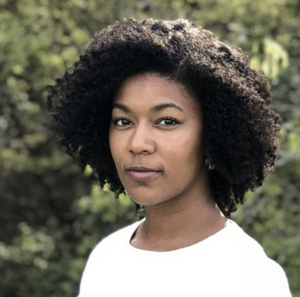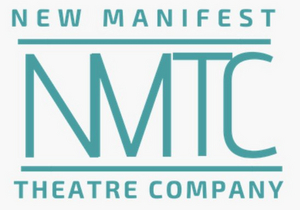Interview: Simone Alexander of New Manifest Theatre Company Creates the Change She Wants to See
A conversation on the lack of diversity in the theatre community, what the future holds, and New Manifest's annual play festival.

Madelyn Geyer: We're more than halfway through a historic and heartbreaking year in the world, and especially for the United States. How are you doing and what is this year been like for you so far?
Simone Alexander: It's definitely a time of reflection. For me personally, from an artist's perspective, it's been great to take this time to find my own community and start conversations within. It's great to find ways to help your own community locally. This is all going on on a global level, but I truly believe change happens at the local level. It's been great to commune with my fellow Black artists here in Austin and come up with a collective of how we can make this world better for us, as well as for our fellow Black creators in town. We're thinking about how we can serve the community and more people through art, but also how we can look forward to the future.
MG: From your perspective, what is that role of theater and the arts in galvanizing change in Austin for the Black community and letting unheard voices be heard?
SA: That's definitely a multilayered conversation. As Black artists, we're very aware of the inequalities, not only with Black performances on the stage, but also who's involved with those performances from a production and design standpoint. Theater production hierarchy needs to be examined. When you're thinking about the staff that's running these organizations and the lack of diversity in that, it's a time for the bigger organizations to reflect and say, "How many shows highlighting people of color are we actually doing in our season?" Is it just that one show a year? How many people are involved on the production side or are we just putting faces in front of us and calling that diversity? As a producing artistic director who founded a company because of the inequalities and lack of opportunity I felt as a performer, it's not a huge shift in my company to take a reflective look. As a Black woman, I'm already taking into consideration that I want to see faces like me in the production, design, and administrative side. In the future, those are real conversations that we need to have about changing what is currently the status quo of the theater.
SA: We're also all used to the idea that the show must go, so we've created an environment where it's frowned upon for somebody to take a day off. We need more grace and humanity with artistry at all levels. When we do that, we create the environment where actors and creators feel safe to express these hard conversations that they want to express in an artistic medium. I don't understand when people want to do that and then provide absolutely no emotional support for the actors. You have to build in protection for your artists.
MG: You're the Founder and Producing Artistic Director of Austin's New Manifest Theatre Company. What has that journey been like?
 SA: The reason I wanted to build a theater was to create an atmosphere for other actors that I didn't get. Wanting to be a performer and then realizing there aren't a lot of opportunities, that's not a singular experience. Creating New Manifest and even simply putting out a casting call that says "Looking for people of color" is enough for some actors to say: "I've always been in shows where I'm the token person." While unfortunate, that is the majority of our experiences. The number one thing I hear from my ensemble members is: "For the first time, I get to play somebody who is like me. I've never even been offered a role that was like me." That's meaningful! We're now in our second season, so we're still a very young company and taking time to reflect on what we've done so far and the future. I don't think it's special-for a company run by a Black woman-that our first two productions were written by Black playwrights highlighting diverse experiences of people of color. That's just me being a performer of color looking for opportunities and works I find interesting. I surround myself with other Black artists, people of color, and lots of women designers who I like working with because we believe in the same thing.
SA: The reason I wanted to build a theater was to create an atmosphere for other actors that I didn't get. Wanting to be a performer and then realizing there aren't a lot of opportunities, that's not a singular experience. Creating New Manifest and even simply putting out a casting call that says "Looking for people of color" is enough for some actors to say: "I've always been in shows where I'm the token person." While unfortunate, that is the majority of our experiences. The number one thing I hear from my ensemble members is: "For the first time, I get to play somebody who is like me. I've never even been offered a role that was like me." That's meaningful! We're now in our second season, so we're still a very young company and taking time to reflect on what we've done so far and the future. I don't think it's special-for a company run by a Black woman-that our first two productions were written by Black playwrights highlighting diverse experiences of people of color. That's just me being a performer of color looking for opportunities and works I find interesting. I surround myself with other Black artists, people of color, and lots of women designers who I like working with because we believe in the same thing.
MG: You took action. You said: "I'm going to change this." And you did.
SA: That's the number one thing that I've learned. Especially getting away from the educational experience and building my own professional career from the ground up based off of opportunities I'm giving myself. You can't wait for a global pandemic to come around for other theaters to say, "We should have more than one Black show a season" or "We should hire more Black directors." You can't wait for everybody to get on the same page. You have to create that work yourself.
MG: Has there been a memorable moment you've experienced in one of the shows you've directed or produced?
SA: Our experience earlier this year producing Kristiana Rae Colón's good friday was a highlight not only for myself directing and producing it but for everyone involved. What I found inspiring about Kristiana as a playwright is she builds in a call to action when producing her work. In initial talks about producing the show in Austin, she had a "want" list, which included having a Black female director and making sure there are at least five women of color in the cast. I've never worked with a playwright who's so strong in a vision of the play itself. The play touches on issues of sexual assault and school shootings. Because of the heaviness of the show, we set up a support system with open communication so everyone involved could talk about how they were feeling. Creating the space for us to have key conversations, grow, and then present a type of work like that, was powerful. It birthed an impactful piece of theater people could expose themselves to, get out of their heads, and change their perspectives.
MG: New Manifest Theatre is doing a podcast right now. Who has been an inspiring person that you've chatted with?
SA: The podcast is so great. We've already been having these conversations amongst Black artists in Austin off-line and realizing through that conversation that we don't get to know each other as much because we're all so busy. A great relationship I've found through that is Lisa B. Thompson, who's a professor at UT and also a playwright. The three plays in the most recent book she released were all Austin world premieres. When you have a playwright of that caliber creating such real, authentic work for the community, it's powerful. Talking with her and following her career as it's unfolding has been very inspiring.
MG: Having to be creatively flexible in quarantine is opening up doors for many projects you never thought you would do.
SA: Totally. Because of quarantine, I'm finding myself in Zoom rooms with other theater collaborators, especially the BIPOC community. It's created this world of support where people are sharing testimonials of things that they've gone through and providing language for microaggressions or injustices that we might be facing and might not have language to explain in a moment. I found this room so supportive, especially since we were all on these equal playing fields. In a Zoom room, where you can see into other people's worlds, it produces a new level of humanity.
MG: manifest minifest is happening September 24th to the 26th. Can you tell me a little bit about that and how it's going to look different than last year?
 SA: manifest minifest is our annual short play festival! This year we've already planned to extend the festival to not only include the plays themselves, but also Artist Workshops. We were able to get some fabulous panelists to do these workshops, so I'm really excited about that. For the plays themselves, they'll all be prerecorded and edited ahead of time and then be streamed throughout the weekend. And then we're also hoping to have talkbacks with the director and playwright after each show. We're doing a design workshop as well as a playwriting workshop with the two playwrights whose work we've produced. We'll then close out our workshops with a great artist self-care workshop.
SA: manifest minifest is our annual short play festival! This year we've already planned to extend the festival to not only include the plays themselves, but also Artist Workshops. We were able to get some fabulous panelists to do these workshops, so I'm really excited about that. For the plays themselves, they'll all be prerecorded and edited ahead of time and then be streamed throughout the weekend. And then we're also hoping to have talkbacks with the director and playwright after each show. We're doing a design workshop as well as a playwriting workshop with the two playwrights whose work we've produced. We'll then close out our workshops with a great artist self-care workshop.
MG: Many times a movement hits its zenith within the first few weeks and then the fervor begins to slow down all too quickly. How do you see people keeping this going?
SA: I don't ever see it ending to a certain level. Maybe that's just my point of view and my life experiences. For many people this time of social injustice and reckoning with anti-racism caused them to say, "Oh, I just realized I was part of the problem in summer of 2020." For a Black person, my eyes were not first opened in 2020. I'm very familiar with all of these things. We have many people who rallied together to create these BIPOC support groups as we all navigate predominantly white institutions. Even in that work, we're talking about decades of people working in these institutions and dealing with microaggressions and injustices that have been casually thrown their way. That's continuous work we have to do, and continuous trauma we have to navigate through. I don't think it ends. It is a lifelong lesson of "this is the world we live in." It is filled with injustices. Once your eyes are open to it, you can start actively making change in your own life. But even in that realm, you actively make change and you actively choose to make a change every single day. But I've spent all my life being the only Black person in a room and I don't believe that's going to change tomorrow.
MG: Back in March of 2015, there were productions of Hands Up Hoodies Down by Zell Miller III and Pretty Fire by Charlayne Woodard. Theater is a wonderful medium to memorialize these events and keep them in people's minds. Do you think theater and art can help pave a pathway to healing?
SA: I do definitely think it can lead to healing. There are great Black playwrights who have been addressing this in their work since playwriting began. It's a matter of listening and championing that work. I recently came across Aleshea Harris' work. It's healing to me, because she specifically addresses Black people and the trauma we deal with, but also creates a space that we can find some healing in it. She comes full circle. Healing is an experience and Aleshea Harris' What To Send Up When It Goes Down is a beautiful example of what that healing could look like in a very communal sense.
Photo Credit: Nehemiah Alexander
Manifest Minifest- September 24-26
https://newmanifest.org/manifest-minifest-round-2/
New Manifest Theatre Podcast now on Spotify
New Manifest Theatre Company
P.O. Box 49095
Austin, TX 78765
Comments

Videos
